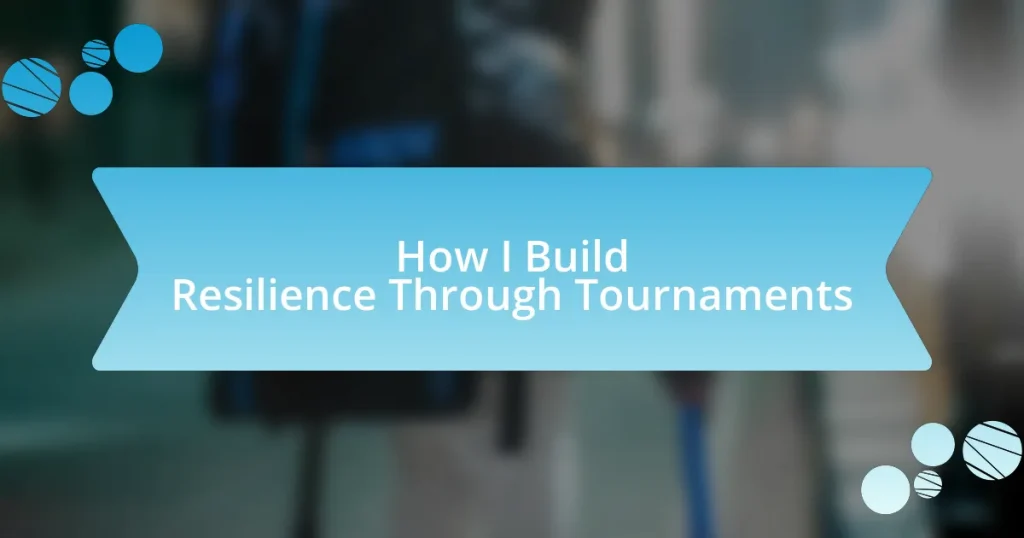Key takeaways:
- Resilience in sports involves adapting and learning from setbacks, rather than viewing them as failures.
- Participating in tournaments accelerates personal development by challenging athletes and providing valuable feedback.
- Setting specific short-term and long-term performance goals enhances focus, motivation, and resilience during competitions.
- Building supportive networks through sharing experiences fosters a sense of belonging and encourages personal growth.
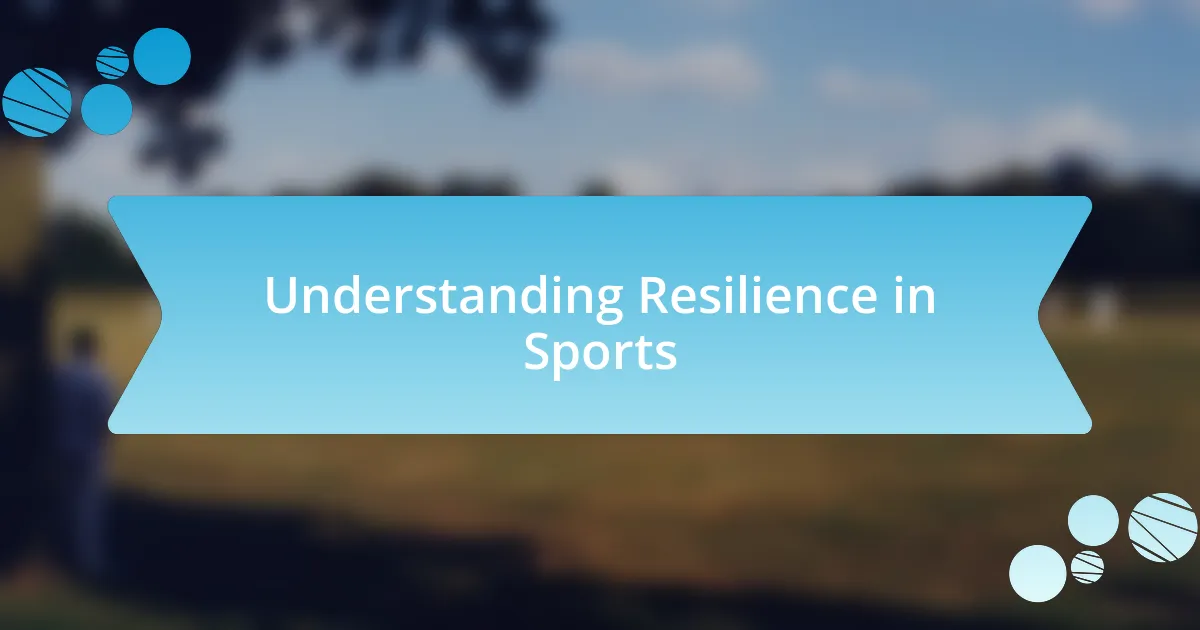
Understanding Resilience in Sports
Resilience in sports isn’t just about bouncing back from losses; it’s about learning to embrace the journey. I remember a time during a particularly tough tournament when I lost a critical match. Instead of seeing it as a failure, I chose to reflect on what the experience taught me. How often do we overlook the valuable lessons that challenges provide?
Every athlete faces setbacks, and it’s the ability to adapt and grow from those moments that forms resilience. It’s easy to feel defeated, but I’ve learned to shift my mindset. When I faced a string of losses, focusing on small improvements in my technique became my lifeline. This shift in perspective helped me build not only my skills but a stronger mental game as well.
Building resilience also means developing emotional strength. I often think back to the adrenaline rush before a big game, coupled with the fear of disappointing my team. That pressure can be overwhelming! Yet, channeling those emotions into motivation has taught me that vulnerability can be a powerful tool. Hasn’t every athlete experienced that dance between doubt and determination? It’s how we navigate these feelings that truly shapes our resilience on and off the field.
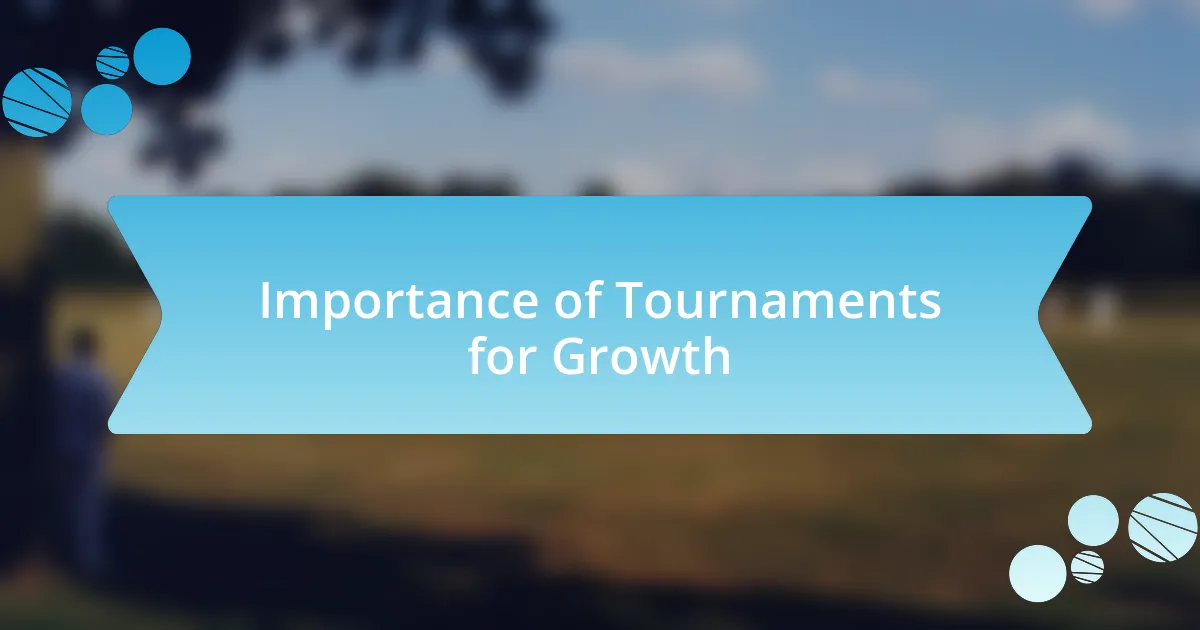
Importance of Tournaments for Growth
Participating in tournaments can significantly contribute to an athlete’s growth. I recall my first tournament feeling a mix of excitement and dread. Each match pushed me beyond my comfort zone, teaching me about my strengths and weaknesses. It was an eye-opening experience, one that highlighted how competition can accelerate personal development.
Tournaments offer unique opportunities for learning, such as:
- Exposure to different playing styles that challenge adaptability.
- High-pressure situations that improve decision-making skills on the fly.
- Feedback from coaches and peers that can lead to skill refinement.
- Networking opportunities with other athletes, fostering camaraderie and support.
- The chance to set and pursue specific goals, enhancing motivation and focus.
Every match is a stepping stone on the path to growth, and embracing these experiences cultivates resilience that extends far beyond just sports. I found that the thrill of competition ignited a drive within me, compelling me to strive for improvement.

Setting Goals for Tournament Success
Setting clear goals is crucial for tournament success. When I approach a tournament, I visualize what I want to achieve, whether it’s mastering a specific technique or finishing in the top tier of competitors. For instance, during one of my early tournaments, I aimed to improve my stamina. By focusing on that singular goal, it transformed my preparation and performance, making every training session more purposeful.
Establishing both short-term and long-term goals can create a robust framework for progress. I learned the value of this firsthand when I set a goal to improve my accuracy over three competitions. With each tournament, I adjusted my strategy and training, which not only enhanced my skills but also built my confidence. This layered approach helped me see tangible results, reminding me that resilience stems from having clear objectives.
I also believe in setting performance-oriented goals instead of outcome-based ones. Instead of fixating solely on winning, I focus on personal milestones like executing a certain number of successful plays or maintaining composure during high-stress moments. In my experience, this shift in perspective keeps the pressures of competition at bay while allowing me to enjoy the process, turning each tournament into a learning opportunity.
| Goal Type | Description |
|---|---|
| Short-term Goals | Focus on immediate performance improvements, such as mastering a technique for the next tournament. |
| Long-term Goals | Focus on ongoing development over multiple tournaments, like improving overall skill level. |
| Performance-oriented Goals | Concentrate on personal achievements rather than winning, such as maintaining composure or executing plays effectively. |
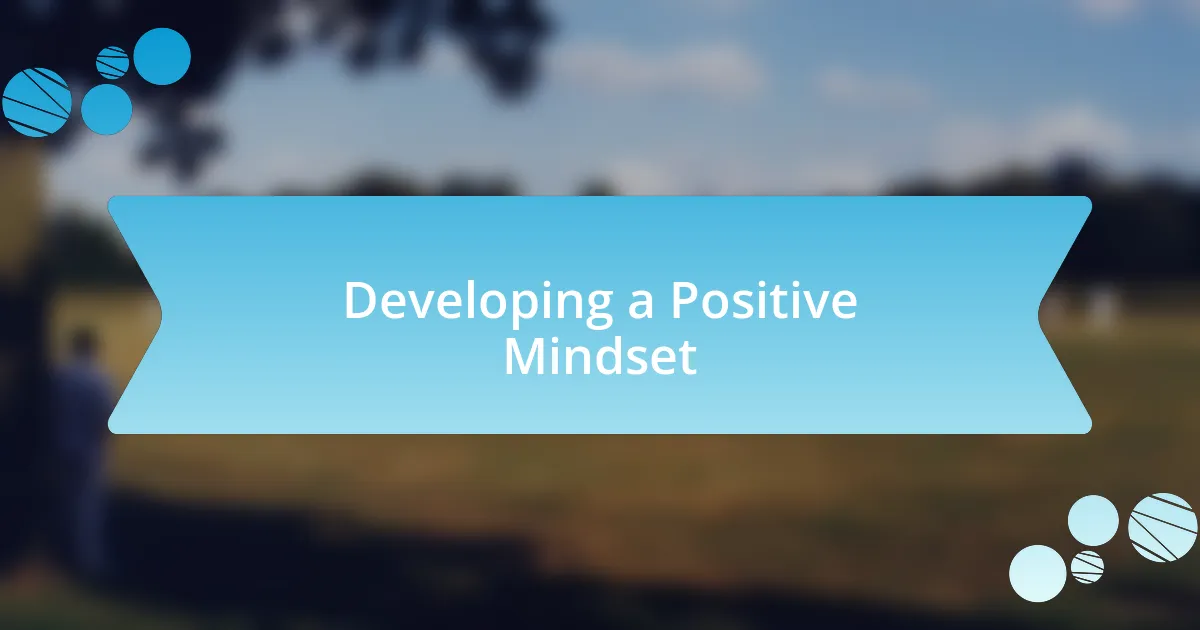
Developing a Positive Mindset
Developing a positive mindset is crucial, especially in the high-pressure environment of tournaments. I remember preparing for a particularly challenging event where I felt the weight of expectations. I decided to embrace a mantra: “Focus on growth, not perfection.” This simple shift in perspective helped me approach each moment with curiosity instead of fear, transforming my nerves into excitement.
I’ve learned that maintaining positivity requires consistent self-talk. I often find myself reminding my inner voice that setbacks are simply stepping stones to improvement. During one tournament, I faced an early loss that sparked self-doubt. However, I chose to reflect on what I could learn rather than dwell on the defeat. That mindset not only changed how I processed my emotions but also enhanced my determination to come back stronger.
Cultivating a positive outlook also means surrounding yourself with uplifting influences. I’ve found that sharing my goals and challenges with supportive teammates inspires me to stay positive. On one occasion, after a tough practice, a teammate shared his struggles, reminding me that we all face obstacles. That connection renewed my motivation and highlighted the importance of community in fostering resilience. Wouldn’t you agree that encouragement from others can amplify our determination?
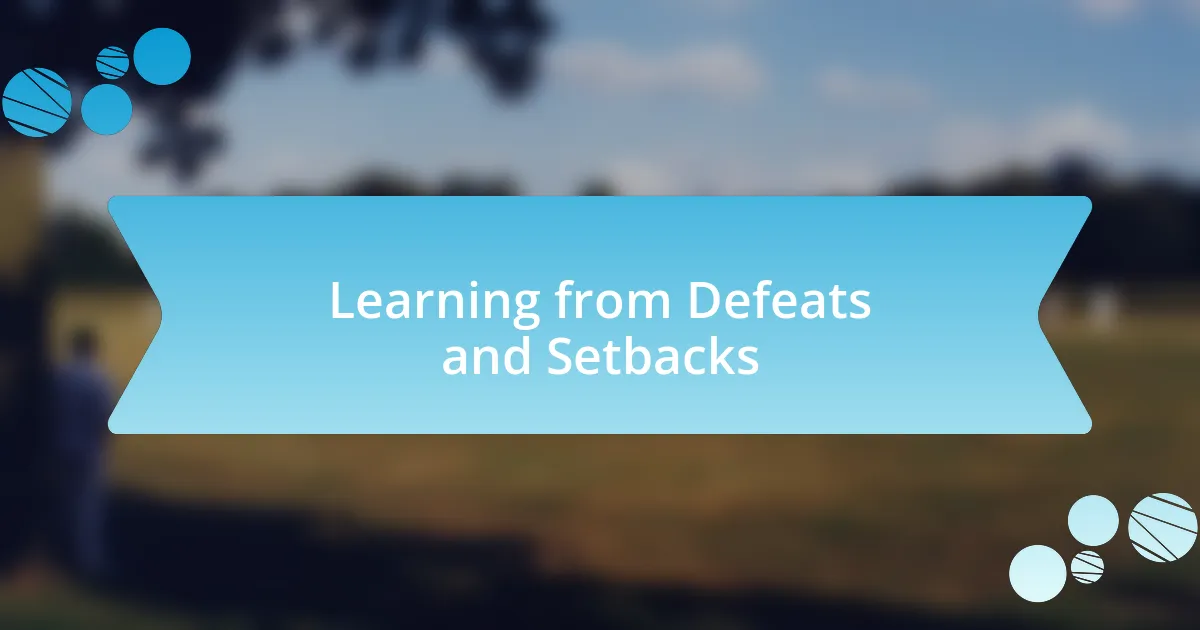
Learning from Defeats and Setbacks
Defeats can feel crushing, but I’ve learned to view them as valuable lessons rather than failures. For instance, after a particularly disappointing tournament where I lost in the first round, I spent time analyzing my performance. Instead of wallowing in frustration, I identified specific areas for improvement, like my strategy and focus. This process not only helped me learn but also ignited a determination to rise above the setback.
Setbacks often bring a mix of emotions, and I’ve found it crucial to process them constructively. I remember a time when I faced a defeat that left me questioning my abilities. In the midst of that, a mentor reminded me that even the best athletes experience failure. This conversation opened my eyes; rather than seeing defeat as a reflection of my worth, I began to associate it with growth. How often do we underestimate the potential for growth that lies within our struggles?
Connection with others during tough times is equally essential. After a loss, I reached out to friends and shared my feelings of disappointment. Their stories of overcoming similar hurdles offered me fresh perspectives and a renewed sense of purpose. Isn’t it interesting how simply sharing our experiences can transform feelings of isolation into a shared journey? Each setback can become a stepping stone when we allow those around us to inspire us to keep moving forward.
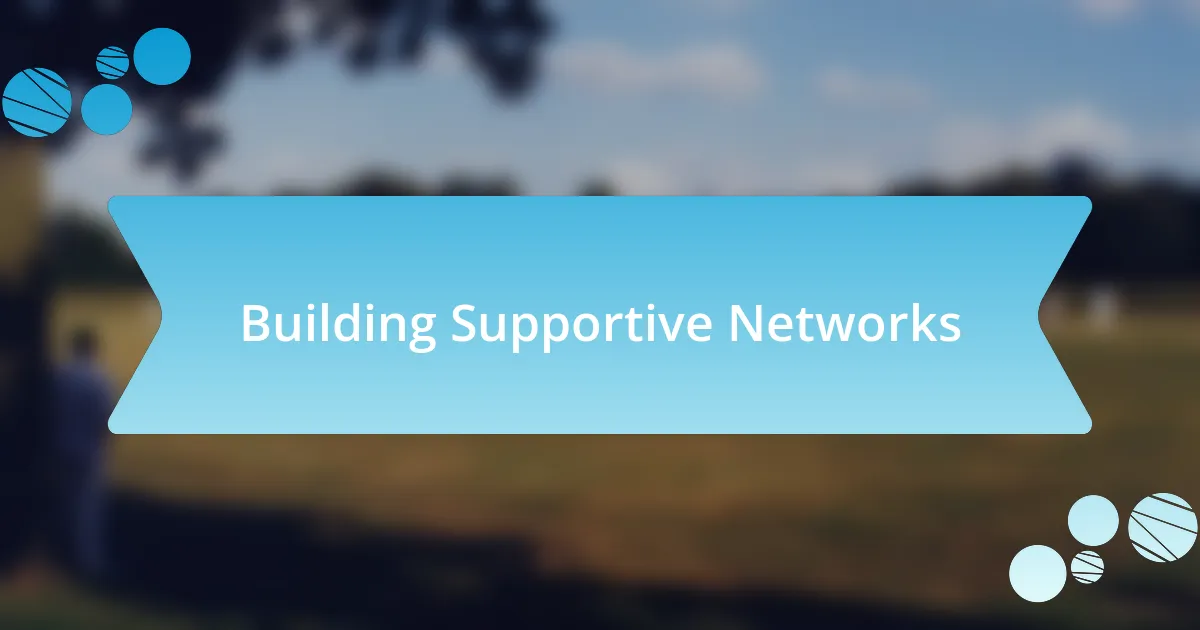
Building Supportive Networks
Building supportive networks is vital for resilience, and I’ve experienced this firsthand. During one particularly grueling tournament season, I made an effort to connect with fellow competitors. We started a small group where we could share not just our successes but also our vulnerabilities. It amazed me how much lighter I felt after discussing my challenges and hearing their stories. Isn’t it reassuring to know that others share similar struggles?
I also remember a time when a teammate reached out to me after a tough competition. They expressed their frustration about a performance that didn’t meet their expectations. I could relate entirely, as I had felt the same way just weeks prior. Sharing that moment forged a stronger bond and reminded us both of the importance of leaning on one another. Building a network where we can openly discuss setbacks cultivates a sense of belonging. It transforms lonely battles into collective journeys.
Moreover, I found mentorship to be a cornerstone of my support network. Having a mentor who not only offered guidance but also shared their own journey of ups and downs deepened my perspective. Once, during a particularly difficult phase, they took the time to share their own defeats and the lessons learned from them. This not only motivated me but also highlighted that resilience isn’t a solitary endeavor; it’s built together. Don’t you think that the bonds we create can turn our toughest moments into shared experiences that empower us all?
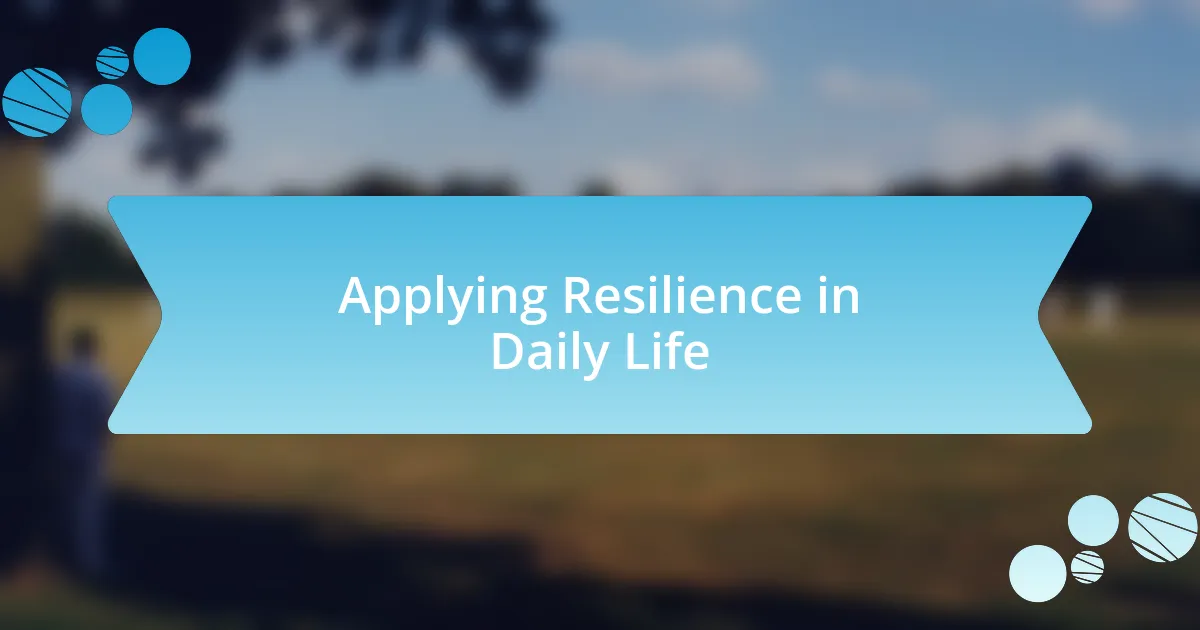
Applying Resilience in Daily Life
Resilience isn’t just a trait seen in tournaments; it’s something I strive to incorporate into my daily routine. I remember a particularly stressful week when everything seemed overwhelming. Rather than allowing frustration to take over, I made a conscious effort to focus on small, manageable tasks. By breaking down larger challenges into bite-sized pieces, I felt a sense of accomplishment with each completed task, which fostered my resilience. Isn’t it interesting how focusing on the little wins can drastically change our outlook?
Throughout my journey, I’ve learned the power of perspective in fostering resilience. There was a moment when I faced a significant obstacle in my professional life that felt insurmountable. Instead of succumbing to stress, I challenged myself to view it as an opportunity for growth. This shift in mindset didn’t happen overnight; it took practice and conscious effort. Embracing challenges as learning experiences has since become a cornerstone of my approach to both personal and professional setbacks.
Taking regular breaks to recharge is something else that has proven invaluable. I recall one evening when I felt mentally drained after a long day. Instead of pushing through, I stepped outside for a short walk, letting myself soak in the fresh air. That simple act of stepping away not only refreshed my mind but also offered me new insights into the challenges I was facing. How do you recharge when life feels overwhelming? It’s important to identify what works for you, as those moments of rest can build the resilience needed for the next challenge.










